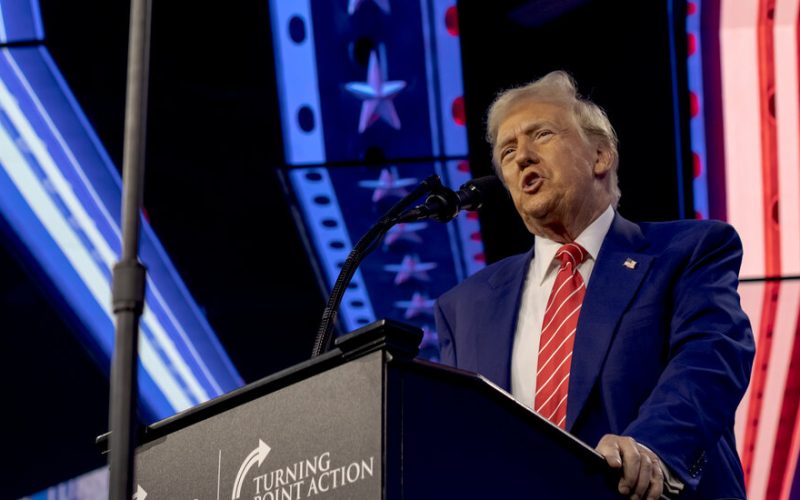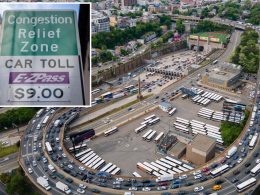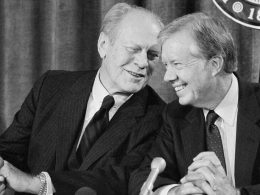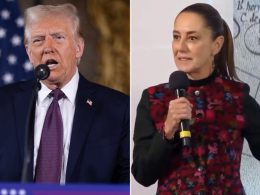President-elect Donald Trump is still a week away from taking office, but his musings about coercing Canada to join the United States while acquiring Greenland and the Panama Canal — declining at one point to rule out the use of military force in those two particular cases — have made for a surreal prologue to his second administration. It’s a fixation that has set world leaders on edge and forced congressional Republicans into the odd position of insisting that the incoming president is not planning to storm the Arctic.
“The United States is not going to invade another country,” Senator James Lankford, Republican of Oklahoma, said yesterday on “Meet the Press.” Trump, Lankford insisted, was simply making “bold” statements intended on getting “everyone to the table.”
Whether the words are a negotiating tactic or something more, the president-elect’s expressed desire to expand the nation’s footprint reflects an urge that has animated much of his career in the public eye: to make whatever he controls as big as possible.
In that sense, Trump’s talk of taking control of Greenland and seizing Canada by “economic force” can be viewed less as an articulation of a foreign policy objective than as an extension of an ethos that goes back to his single-minded efforts to expand his businesses through a series of acquisitions in the 1980s.
In tonight’s newsletter, we’ll explain why.
Painting other people’s houses
The prime minister of Greenland says the territory wants to work more closely with the United States on certain issues, but Greenlanders, like Panamanians, have expressed little interest in actually handing their territory over to Americans.
As a businessman, Trump, though, has often paid little mind to the people standing in the way of his desired expansions, although they have sometimes found ways to stop him.
In the early 1980s, as Trump was building a public reputation as a developer and seeking to step out from his father’s shadow, he acquired a 15-story building at Central Park South and made plans to knock it down for a luxury high-rise condominium project. His problem? The people who already lived there.
Instead of buying them out, as was common at the time, tenants alleged that he sought to force them out, by skipping maintenance, handing out eviction notices and inviting homeless people to move into some of the units.
“It was a long battle, but it was a successful battle,” he said later, even though it was the tenants who prevailed, while he was forced to change his plans.
A few years later, Trump, looking to improve the area around the Trump Plaza casino in Atlantic City, directed people working for him to go paint some houses that looked run-down near his property. He never sought permission to do so, and instead just did it.
One resident, James Corcione, told The New York Times at the time, “What gives him the right? He should have asked me.”
Trump essentially shrugged off the idea that he should have asked first. “I wanted to make them look nice,” he said.
Decades later, he posted a picture on social media of North America with Canada covered in stars and stripes — painted over like a house in need of a paint job in Atlantic City.
From ‘take the oil’ to ‘Oh Canada’
Despite his claims to the contrary, Trump has been thwarted on some of his expansion efforts. Trump sought to force a widowed homeowner out of her home to make room for landscaping and parking at one of his casinos, but she prevailed. He rapidly expanded his casino empire by borrowing money at high interest rates — a move that brought about bankruptcy later on.
He viewed the world as his for the taking — an attitude that is now on display again on a much larger stage. But instead of painting other people’s homes without their say-so, Trump is essentially talking about global land grabs.
He has long displayed a rhetorical disregard for the norms of international sovereignty and diplomacy. As a candidate in the 2016 presidential election, he said the United States should simply “take the oil” controlled by the Islamic State.
His fascination with Greenland goes back to his first presidency, when a special team evaluated the prospects of leasing the Arctic territory, which is a semiautonomous territory of Denmark, a NATO ally.
“I always said: ‘Look at the size of this. It’s massive. That should be part of the United States,’” Trump told our colleague Peter Baker.
(On maps showing the Mercator projection, Greenland looks considerably larger than the United States; in reality, it is about one-quarter the size of the continental United States.)
His post showing Canada covered in stars and stripes came with a two-word caption: “Oh Canada!”
In so many ways, things are flat and the same for Trump. A local real estate spruce-up is indistinguishable from saying, as he did last week, that he’ll rename the Gulf of Mexico the Gulf of America. And he is going to find resistance, as he did back in his casino days.
But floating outrageous-sounding ideas and seeing how far he can take them is his longstanding modus operandi.
The mayor who said she wouldn’t travel overseas
Three years ago, Karen Bass, a former congresswoman who traveled the world representing the United States, told my colleague Shawn Hubler that, if elected mayor of Los Angeles, she’d give up those trips. Now, a visit to Ghana that coincided with the outbreak of wildfires has handed Bass the first crisis of her tenure. Here’s more.
If elected mayor, Bass said, “the only places I would go would be D.C., Sacramento, San Francisco and New York, in relation to L.A.”
But Bass has traveled out of the country at city expense at least four other times in recent months before the Ghana visit — once to Mexico for the inauguration of President Claudia Sheinbaum and three times to France for the 2024 Olympic Games in Paris.
Her broken promise to cut off overseas travel and her busy international schedule since becoming mayor in December 2022 scarcely registered with the public before the wildfires, and Los Angeles voters accepted — and in some cases even welcomed — the mayor’s identity not just as a municipal leader but also as a Washington-style global player.
Now, though, rivals have lashed out at her for being absent as the fires broke out. Liberal supporters whose homes burned down have become outraged critics. An online petition demanding her immediate resignation has attracted more than 100,000 signatures. MAGA Republicans and their allies have swarmed social media, amplifying and exploiting the anger.
— Shawn Hubler and Soumya Karlamangla








